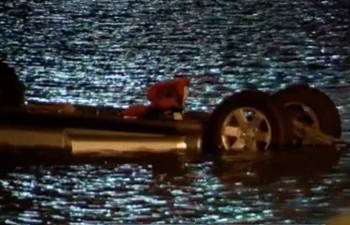Channarayapatna, Jan 10: Seven employees of Toyota Kirloskar in Bidadi, who were on a trip to religious places, died when their SUV plunged into a lake near here on Saturday.

According to the police, the deceased have been identified as Karthik (26) of Kuppur village in Turuvekere taluk in Tiptur, Dilip (23) of Thimmegowdana Doddi in Bidadi, Jayanth (24) of Arechakenahalli in Maddur taluk in Mandya, Satish (25) of Nallur village in Chamarajanagar district, Shivaswamy (25) of Halagur village in Mandya district, Janardhan (24) of Machohalli in Magadi taluk and N?R?Raju (24) of Nagaranahalli in Holenarasipura taluk in Hassan district. Prasanna Kumar, Raghu and Prashanth, who managed to escape, are undergoing treatment at the Hassan district hospital.
A group of friends had recently secured jobs after completing a training programme at Kirloskar.
They hence, decided to go on a pilgrimageto Hornadu Annapoorneshwari temple in Chikkamagaluru district.
Ten of them were travelling in the SUV, a Mahindra Scorpio, while the remaining four drove in a Maruthi Swift. They started their journey from Mandya on Friday at 10.30 pm.
Prasanna was driving the SUV and around 1.30 am they were near the Janivara lake. He lost control over the vehicle at a turn and it plunged into the lake beside the road. Prasanna managed to break open the window and saved two others. Even though the other car, Swift, was just a little distance behind, they did not spot the SUV in the water.
Swamy, a Janivara villager, who was passing by, noticed the vehicle in the pond.
The Fire and Emergency Services personnel and the police took the bodies out of the pond.
“I ?don’t work with them (deceased), but we were all friends for the last three years. They would call me ‘Anna’ as I?am older than them. All of them had got jobs at Kirloskar recently. On January 6, one of the deceased and me share our birthdays. So, we planned to celebrate by visiting temples.
As it was too cold and there was thick mist, all the windows were closed and I could not see the right turn. Even though I?applied the break, the vehicle did not stop and plunged into the pond. I?broke open the window and could rescue only two of my friends,” Prasanna explained. Prasanna has sustained injuries on his hands and is undergoing treatment.






Comments
Fate
Add new comment